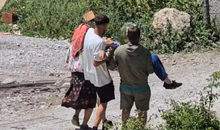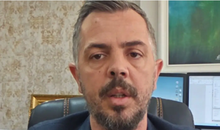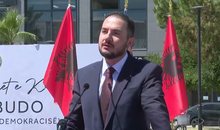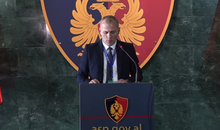
 Flash News
Flash News
Korça/ 40-year-old man jumps from fifth floor balcony, in critical condition
Croatia restores compulsory military service
Illegal constructions in Theth, Manja demands disciplinary proceedings against prosecutor Elsa Gjeli
Details from the murder of Renis Dobra, the perpetrators came with 2 Range Rover cars from Rrëshen
The Supreme Court left him in prison, Meta addresses the 'Constitution'
Steinbaum: The establishment of the Association by the Kosovo government contradicts the Constitution

The Group for International Public Policy and Law in Washington published a report these days in which it says that the requests to the state authorities of Kosovo to establish the Association of municipalities with a Serbian majority contradicts the Constitution of Kosovo and that the powers that this constitution provides would be violated. gives to the municipal authorities.
In an interview with Voice of America, one of the authors of the report, Jason Steinbaum, who in the past was an adviser to the chairman of the Committee on Foreign Relations of the House Eliot Engel, told his colleague Garentina Kraja that the process of the Association, which is the main issue that has caused the biggest clashes between the United States and Kosovo, has been politicized and that the constitutional way, through which the municipalities can create the association themselves, is a way out of the impasse.
Voice of America: Mr. Steinbaum, in your new report drafted together with Professor Paul Williams, you came to the conclusion that the request to create the Association of Serb-majority municipalities in Kosovo is against the constitution and that it should not be done. However, the creation of the Association is a central issue in the efforts of the United States and the EU to normalize relations between Kosovo and Serbia? Why do you think they are wrong?
Jason Steinbaum: Our report describes the process that the Constitution of Kosovo presents, and the Constitution of Kosovo presents a process based on which only municipalities have the authority to create associations. So, if they want one, according to the analysis we made of the Constitution of Kosovo, then let them create it. They can create the association at any moment they want, regardless of what the international community, the state authorities of Kosovo or the government of Serbia say, or regardless of the dialogue. They have the authority to do such a thing now, according to the constitution of Kosovo.
An important point of our report is that the municipalities have the powers to create the association. But in order for municipalities to do this, they must have elected officials, and this means that the local Serbian community must participate with candidates in the elections. They have boycotted elections, largely instigated by Belgrade in recent years. But I hope that in the future they will decide to run in the elections for these local government positions. And if they want to establish the association then through these elected by democratic elections, then they will have the powers and officials to do so. It would be a double win for the community, for Kosovo, for the international community, because they would win their association, but also their elected officials, who we all want to see run for election and take office. in their posts.
VOA: However, what you refer to as the "constitutional path" has been bypassed by the European Union and the United States. Why do you think this happened?
Jason Steinbaum: I think they're all people of good will. I think they want to help a community establish an association, which they said they love, and that's not a bad thing. These people want good for Kosovo and the people who live in these cities in the northern part. But I think it's probably more appropriate for the United States to stick to the rule of law, to follow the Constitution, which, let's be honest, they helped draft. We participated in the drafting of that constitution. So, maybe it's time to go back and review it and ask ourselves, 'what went well in this process, what didn't go right and how can we help this community to find solutions as defined by the Constitution? '.
Voice of America: Do you think that maybe the process has been politicized?
Jason Steinbaum: The constitution foresees a process based on which the municipalities make the decision to establish associations, or to join them, as has already happened with the creation of the regular association of municipalities, which the municipalities themselves have established. But, by making requests to the state authorities in Kosovo, in a way this makes it part of the political process. In fact, more than ten years have passed and the governments of Kosovo, led by four political parties, have not done this. Frankly, maybe it's time to take a step back and look at what the law says and maybe there's a way to go about taking the pressure off, de-politicizing it and softening the emphasis.
Voice of America: Several governments in Kosovo, including the current government, have agreed to create the association. Do you blame the government for backing out of an issue it agreed to in advance?
Jason Steinbaum: Nuk është kompetencë e tyre në radhë të parë, bazuar në Kushtetutë. Kosova e konfirmoi se do të bëhej me marrëveshjen e vitit 2013. Në atë marrëveshje, që u ratifikua nga kuvendi, qeveria tha se do të ketë një asociacion të komunave me shumicë serbe. Ata nuk e themeluan. (Po ta bënin këtë) do të shkelnin Kushtetutën, por ata po shprehnin dëshirën dhe kjo është në rregull. Ajo marrëveshje gjithashtu tha se do të themelohej dhe se statuti i saj do të shkruhej në të njëjtën mënyrë si asociacioni i zakonshëm i komunave, që e krijojnë vetë komunat. Nuk mendoj se qeveria në fakt ka kompetenca ta bëjë një gjë të tillë. E kuptoj argumentin dhe kritikat, por mendoj se ka një mënyrë më të mirë për ta bërë këtë gjë, që t’i kthehemi dhe të shohim Kushtetutën.
Zëri i Amerikës: Megjithatë, kjo çështja e asociacionit është bërë njëra prej mosmarrëveshjeve kryesore ndërmjet Kosovës dhe Shteteve të Bashkuara, ndonëse jo e vetmja. Kjo marrëdhënie, sipas shumë vëzhguesve, është në pikën e saj më të ulët. A e ndani këtë vlerësim? Cila është pikëpamja juaj?
Jason Steinbaum: Mendoj se interesat e Shteteve të Bashkuara dhe Kosovës përputhen në periudhën afatgjatë. Popujt tanë janë të afërt dhe vlerat e dy shteteve tona janë pothuajse të njëjta. Ka mosmarrëveshje ndërmjet qeverive dhe kjo nuk është çështje që e trajtojmë në raportin tonë. E di që ka disa mosmarrëveshje, të cilat janë ashpërsuar, por nuk janë temë e raportit tonë. Ne shohim një dalje, një rrugë, një proces kushtetues për të zgjidhur njërën prej çështjeve më të vështira për të cilën palët kanë mospajtime.
Zëri i Amerikës: Dhe cila mendoni ju se është rrugëdalja, jo vetëm sa i përket Asociacionit, por edhe procesit të dialogut në përgjithësi. Cila është këshilla juaj për ndërmjetësit e angazhuar në këtë proces? Qeveria amerikane sapo ka emëruar një ndërmjetës të ri. Ju keni qenë të angazhuar me rajonin për një kohë të gjatë...
Jason Steinbaum: Mendoj se aktualisht jemi në një moment kur bashkësia ndërkombëtare, Shtetet e Bashkuara dhe Bashkimi Evropian mund të presin pak. Janë zgjedhjet në Shtetet e Bashkuara, do të ketë zgjedhje në Kosovë. Po bëhet zëvendësimi i disa zyrtarëve kyçë, përfshirë të dërguarin tonë, si dhe ambasadorin e BE-së në Kosovë, dhe më duket edhe vetë zotin Lajçak. Do të ketë ndryshime të individëve. Nganjëherë njerëzit e rinj mund të sjellin ide dhe qasje të reja dhe mbase kjo është edhe një mënyrë për të bërë një pauzë. Dhe pastaj me ardhjen e qeverive të reja dhe njerëzve të rinj, mund ta shohim nga perspektiva e re këtë çështje dhe të përpiqemi ta shikojmë se çfarë po ndodh nga aspekti kushtetues.
Zëri i Amerikës: Prej mbi një dekade është bërë një proces i vazhdueshëm dialogu për të arritur një lloj marrëveshjeje të negociuar ndërmjet Kosovës dhe Serbisë. A mendoni se ekziston me të vërtetë dëshira për të arritur një marrëveshje të negociuar?
Jason Steinbaum: I'm not so sure. I think both sides are at a pretty big impasse. I do not see the interest of the government of Serbia, I am not sure that they see it as in their interest to reach an agreement. They say they oppose a sovereign Kosovo and reaching an agreement does not seem to be in their interest. From Kosovo's point of view, they want an agreement now and recognition and that doesn't seem likely to happen in the near future. Dialogue is always a good thing. Finding solutions to functional problems between countries is a good thing, so I hope it continues. I hope that it will not focus too much on areas that are entirely within the sovereign territory of Kosovo and that are part of its sovereign decision-making authority.
Voice of America: How realistic is it to expect the participation of Serbs in the elections considering the current situation, be it the current tensions, or the incidents of the past year, including the armed attack in Banjska? For Belgrade to encourage them to participate?
Jason Steinbaum: I don't know the answer to that question. I think it could happen with a greater push from the international community, if they say your future is in your hands instead of putting it in the hands of the dialogue, or in particular the government in Belgrade, because they don't govern there, or to govern in Pristina.
The Ahtisaari process envisioned local control and powers for the municipalities, and I think that the way this process developed and how it turned into a constitutional approach, maybe we find a new way to solve this, or find a new path to moving forward that will soften the emphasis that has been placed on (the Association), depoliticize it and remove the tensions surrounding it. VOA
Latest news


Malltezi: SPAK admits, we are in a process that began with Balla's false report
2025-07-10 22:34:16

Si të çliroheni nga bllokimet emocionale me anë të ushtrimeve
2025-07-10 21:57:24

Lala: Veliaj wanted to return as mayor
2025-07-10 21:40:46

VIDEO/ Brawl in Bolivian parliament, deputies physically clash
2025-07-10 21:20:30


Albania experienced one of the longest heat waves of the last decade
2025-07-10 21:01:09

The Government approves new procedures for declaring residence in e-Albania
2025-07-10 20:39:32

Koka: Northerners will not forget Edi Rama's racist operation in Theth
2025-07-10 20:18:24
The 3 zodiac signs that will be most affected by the 'Full Moon' of July 10
2025-07-10 20:04:49
New director of the National Center of Cinematography appointed
2025-07-10 19:51:12
Korça/ 40-year-old man jumps from fifth floor balcony, in critical condition
2025-07-10 19:40:19
'Tired Woman'/ The Syndrome That Affects Thousands of Women Every Day
2025-07-10 19:34:02
Jane Birkin's original Hermès bag sells for $10 million
2025-07-10 19:26:22

Britain-Ukraine agreement signed for 5,000 Thales missiles
2025-07-10 19:00:25
Fire in Zvërnec, flames endanger two hotels
2025-07-10 18:57:19
Croatia restores compulsory military service
2025-07-10 18:39:01
Spahia: The great truth of the strong accusation of the residents of Theth
2025-07-10 18:35:07


The Supreme Court left him in prison, Meta addresses the 'Constitution'
2025-07-10 17:57:21
New punishment with 'new' regulations
2025-07-10 17:54:46
EU translator fired over fears for Zelenskyy's safety
2025-07-10 17:45:37
'You are a policeman, but not God, take my soul', protest for Agon Zejnullahu
2025-07-10 17:41:21


Video/ Rama repeats the scenario, kneels before Meloni again
2025-07-10 16:56:31
He set fire to a plot of olive trees, 50-year-old man arrested in Shijak
2025-07-10 16:46:19

Rubio: US and Russia have exchanged new ideas for Ukraine peace talks
2025-07-10 16:36:20
Death of 27-year-old, Lipjan Police Commander Resigns
2025-07-10 16:21:28
Video/ An apartment burns in Tirana near the New Bazaar
2025-07-10 16:09:36


Jensila lights up the internet with her birthday greetings to Ledri
2025-07-10 15:42:08
They're full of pesticides! List of 12 products we need to be careful of
2025-07-10 15:31:04

Worker falls from scaffolding in Shëngjin, urgently sent to Trauma
2025-07-10 15:11:03
Malltezi: Within one day they seized my accounts, properties and shares
2025-07-10 15:01:23
EU: Israel has agreed to more aid to Gaza
2025-07-10 14:55:19


Murder of Reni Dobra, 23-year-old's vehicle pulled from the water
2025-07-10 14:29:23
Trump's tariffs on Brazil raise coffee prices
2025-07-10 14:16:07
Ursula von der Leyen survives no-confidence vote
2025-07-10 14:04:27


Fire in Lezha, flames near electrical substation
2025-07-10 13:32:24
Residents clash with police in Theth, a woman faints
2025-07-10 13:24:38
"Rama and Xanun"
2025-07-10 13:15:46

Zodiac signs most likely to get divorced in July 2025
2025-07-10 12:45:51
A scapegoat for an illegitimate Republic
2025-07-10 12:35:02
"He has devastated his own nation"/ Berisha: Rama imprisons his opponents!
2025-07-10 12:26:54

Albanian man injured with knife in Italy
2025-07-10 12:08:55






23-year-old in Mat drowned with rope, 4 suspects are being held
2025-07-10 10:58:53

After the dismissals, the new director of the Shkodra Police is appointed
2025-07-10 10:30:10
BIRN: Rama's action for public spaces, a repeated spectacle
2025-07-10 10:29:11
Action in Theth, Shkodra Police leaders dismissed
2025-07-10 10:16:28
Fatal accident on the Tirana-Durres highway
2025-07-10 10:01:58
The incinerator does not exist, but the government continues to increase funds
2025-07-10 09:51:45
Albania is aging at a rapid pace! 30% of the population is over 60 years old
2025-07-10 09:46:23
End of an era, Modric says 'goodbye' to Real Madrid
2025-07-10 09:36:09
Mount Dukat has been on fire for 6 days, residents request air intervention
2025-07-10 09:27:24

"Poverty on the rise"/ DW: Many people in Germany are not getting paid
2025-07-10 09:08:06
Horoscope, what do the stars have in store for you today?
2025-07-10 08:51:59




The scorching heat returns, the thermometer climbs to 40°C
2025-07-10 07:58:52
Morning Post/ In 2 lines: What mattered yesterday in Albania
2025-07-10 07:46:35
Tourist operator in Theth: They are demolishing our houses without warning
2025-07-09 22:54:57

Trump and Israeli commander warn: Gaza ceasefire could be near
2025-07-09 22:13:21
Fire in Elbasan Landfill, pedagogue: It is a cancer and environmental crime
2025-07-09 21:54:47


Dangerous summer, number of snake bites increases
2025-07-09 21:22:13
Berisha appeals again: Stop state terror against the residents of Theth!
2025-07-09 21:15:36
'Kissing disease' virus linked to several forms of cancer
2025-07-09 21:04:44
Malltezi confesses after release: Justice has become a political weapon
2025-07-09 20:51:48
Vokshi: Albania's EU integration has stalled due to lack of free elections
2025-07-09 20:37:21
